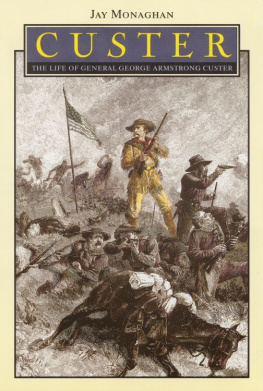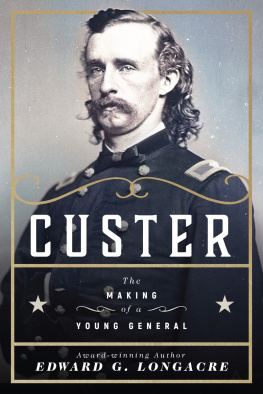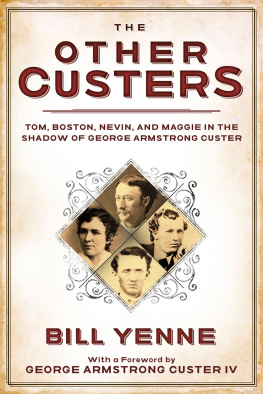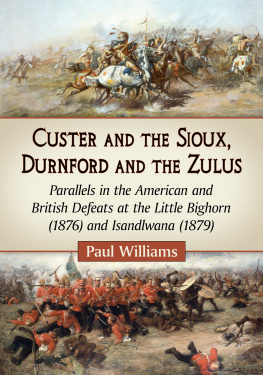Jay Monaghan - Custer: The Life of General George Armstrong Custer
Here you can read online Jay Monaghan - Custer: The Life of General George Armstrong Custer full text of the book (entire story) in english for free. Download pdf and epub, get meaning, cover and reviews about this ebook. year: 2013, publisher: UNP - Bison Books, genre: Detective and thriller. Description of the work, (preface) as well as reviews are available. Best literature library LitArk.com created for fans of good reading and offers a wide selection of genres:
Romance novel
Science fiction
Adventure
Detective
Science
History
Home and family
Prose
Art
Politics
Computer
Non-fiction
Religion
Business
Children
Humor
Choose a favorite category and find really read worthwhile books. Enjoy immersion in the world of imagination, feel the emotions of the characters or learn something new for yourself, make an fascinating discovery.
- Book:Custer: The Life of General George Armstrong Custer
- Author:
- Publisher:UNP - Bison Books
- Genre:
- Year:2013
- Rating:3 / 5
- Favourites:Add to favourites
- Your mark:
- 60
- 1
- 2
- 3
- 4
- 5
Custer: The Life of General George Armstrong Custer: summary, description and annotation
We offer to read an annotation, description, summary or preface (depends on what the author of the book "Custer: The Life of General George Armstrong Custer" wrote himself). If you haven't found the necessary information about the book — write in the comments, we will try to find it.
Custer: The Life of General George Armstrong Custer — read online for free the complete book (whole text) full work
Below is the text of the book, divided by pages. System saving the place of the last page read, allows you to conveniently read the book "Custer: The Life of General George Armstrong Custer" online for free, without having to search again every time where you left off. Put a bookmark, and you can go to the page where you finished reading at any time.
Font size:
Interval:
Bookmark:
CUSTER
The Life of General George Armstrong Custer
by JAY MONAGHAN
With illustrations

UNIVERSITY OF NEBRASKA PRESS LINCOLN
Copyright 1959, by James Monaghan
All rights reserved. No part of this book may be reproduced in any form without permission in writing from the publisher, except by a reviewer who may quote brief passages in a review to be printed in a magazine or newspaper.
International Standard Book Number 0-8032-5732-5
ISBN-13: 978-0-8032-5732-0 (pbk.: alk. paper)
ISBN-13: 978-0-8032-5313-1 (electronic: e-pub)
ISBN-13: 978-0-8032-5314-8 (electronic: mobi)
Library of Congress Catalog Card Number 59-5937
Bison Book edition reproduced from the first (1959) edition published by Little, Brown & Company by arrangement with the author.
Dedicated to
MILDRED
with the wish that I might word my affection with Libbie Custers skill
Contents
ILLUSTRATIONS APPEAR BETWEEN PAGES

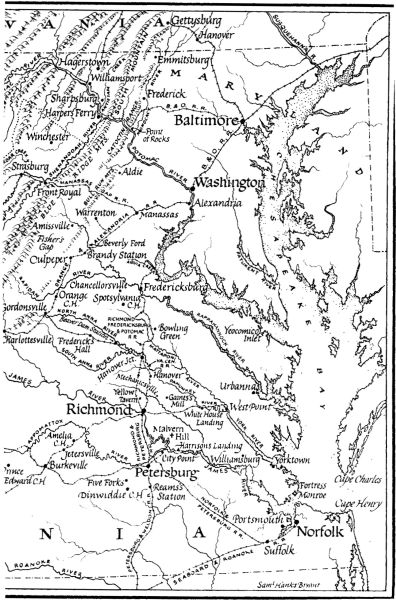
We May All End under Generals Epaulets
L ittle George Armstrong Custers jaw hurt. He clenched his fist as his father led him out of the dentists office and along the street to the hitching rack. Father, he piped, looking up at the bearded man whose thick, horny hand held his little one, I and you can whip all the Whigs in Ohio, cant we?
Emanuel Custer roared with laughter, shaking the long hair which curled over the collar of his rusty frock coat. He was a blacksmith at New Rumley, a community of houses on a hilltop three miles from the town of Scio, Ohio, where the dentist lived.
Driving home, Emanuel stopped everybody on the road to tell about little freckle-faced George Armstrongs bright saying. The curly-headed youngster had a sharp, fox nose and sparkling blue eyes. Childlike, he laughed when others laughed. It was amusing to picture that redheaded chick rushing off to slay an overwhelming number of his fathers Whig enemies. And the joke fitted Emanuel, too, for he would rather talk politics than eat when hungry. He had cast his first vote for Andy Jackson and had opposed the Whigs ever sincedidnt care who knew it, either, and expressed his opinions on all occasions.
The last mile of the road home slanted up a steep hill. Drivers stopped their teams at least once during the pull. Emanuel probably retold George Armstrongs boast to himself as the horses rested. If so, father and son both laughed again. No doubt they enjoyed the prospect of telling the story once more to the family when they reached home.
At the summit, they could look over the horses ears and see, along the road, the first of the double row of homes known as New Rumley. There was no post office or store. Behind the houses the green hills of eastern Ohio rolled away in every directiona magnificent panorama. Emanuels uncle, who had founded this hamlet in 1812, must have appreciated fine scenery. The team trotted down the road and turned into the yard behind a big, plain, two-story clapboard building, which, like the other residences, stood close to the dirt road. Little George had been born in this house on December 5, 1839.
Emanuel unhitched near the blacksmith shop and led his son to the kitchen door. Inside the Custer house there was always an uproara happy, stamping, yelling, joke-playing hubbub. Somebody was inevitably sitting on a bent horseshoe nail or having a chair pulled out from under him.
Emanuel Custer had married twice. His first wife died in 1835, leaving him three children. Within a year he married Widow Maria Kirkpatrick, who joined him with her two. The couple then proceeded to add seven curlyheads to these five. The first two of the new family died in infancy. The third, George Armstrong Custer, survived and became the pet of his parents as well as of his older brothers and sisters. He was called Armstrong by his father, but the name was soon shortened to Autiehis own baby pronunciation. In due time Autie was followed by Nevin J., Thomas Ward, Boston, and finally Margaret. Nevin was an invalid, too delicate to romp with the boys although he outlived them all. Tom, born in 1845, was vigorous. Six years younger than Autie, he grew up imitating everything his older brother said and dida habit which he never completely outgrew.
Emanuel Custer was as noisy as any of his boys. He romped and scuffled with them, making one, then another the butt of some practical joke. His children, on their part, were always watching an opportunity to turn the tables on their father, no matter how roughly. In such a household a child had to be alert to hold his own. None of them knew the meaning of discipline or restraint. They felt little respect for their parents authority but were closely bound to them by an everlasting love. The loyalty and affection of this motley tribe was the most remarkable thing about it. Never could anybody truthfully apply to this bubbling household the old saw: Mas kids and Pas kids are fighting Mas and Pas kids. Quite the reverse! No member of the Custer family ever cared whose child belonged to whom, and George Armstrong Custer, as a grown man, always considered them all one family. Only with a conscious effort could he remember their diverse parentage.
Mother Custer was a handsome womanthin, frail, with regular features and a calm expression. She hid her curls with a cap that covered her ears and was tied under her well-molded chin. Like many successful mothers, she believed that every good little boy must be bad at least part of the time. And when she looked over the tops of the little spectacles she wore for knitting and watched her romping brood, she confessed that red-haired Autie fitted her definition. If any prank had been played he was sure to be at the bottom of it and Tom was never far behind. If Autie stamped into the kitchen from the wash bench on the back porch with a towel around his middle like a wild Indians breechcloth and the tin basin on his head, Tom was sure to toddle behind him with the dipper on his towhead. When Autie sangwhich he did almost continuallyor beat time with his foot, Tom in his highchair tapped an accompaniment with a spoon in his baby fist. Rhythm pulsed with the lifeblood of all the Custer children.
Father Emanuel was one of the good men of the community. He did not drink or play cards, and used tobacco only in a pipe. Loyalty to the friends of his youth was always one of his characteristics.
During Auties boyhood, his father moved the family from the big house to a log cabin on a small farm two miles away. The older children left home for various jobs or marriage. Nine-year-old Armstrong was apprenticed to a cabinetmaker in Cadiz, the county seat, a much bigger settlement than Scio. The courthouse square sloped like a barn roof, for this was still hill-country. The neat brick houses on all four sides displayed an air of prosperity which impressed the young Custers. Here for the first time he heard the thump of a printing press, smelled the fumes from a tannery, saw the glare and felt the heat of an iron foundry.
Two important politicians, Edwin M. Stanton and John A. Bingham, had practiced law in Cadiz. Stanton moved to Steubensville the year Armstrong was born, and Bingham went to Congress in 1855; so it is unlikely that either of them could remember the slim stripling who turned the big foot-lathe in Hunters furniture shop, although both would take considerable interest in him a few years later.
Next pageFont size:
Interval:
Bookmark:
Similar books «Custer: The Life of General George Armstrong Custer»
Look at similar books to Custer: The Life of General George Armstrong Custer. We have selected literature similar in name and meaning in the hope of providing readers with more options to find new, interesting, not yet read works.
Discussion, reviews of the book Custer: The Life of General George Armstrong Custer and just readers' own opinions. Leave your comments, write what you think about the work, its meaning or the main characters. Specify what exactly you liked and what you didn't like, and why you think so.

